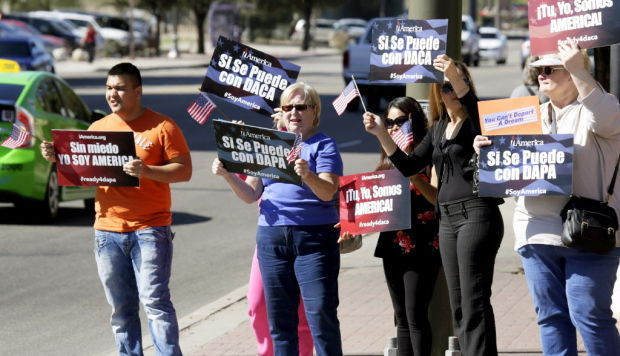PHOENIX — The nation’s high court on Tuesday gave the Obama administration the chance to defend its “deferred action” programs for illegal immigrants even as the justices gave the boot to a head-on challenge to them by Maricopa County Sheriff Joe Arpaio.
In the first order, the U.S. Supreme Court voted to review the decision of a federal judge in Texas that the president and the Department of Homeland Security had acted illegally in deciding that some people who were in this country illegally could stay without fear of deportation. That judge said the administration did not follow the legal requirements for enacting regulations.
Separately, the justices refused to resurrect a challenge by Arpaio to the administration’s deferred action programs. Without comment, the justices let stand a ruling last year by the Court of Appeals for the District of Columbia that Arpaio had no right to sue.
In that ruling, appellate Judge Nina Pillard said the sheriff’s lawsuit is based on the contention that allowing people who arrived in this country illegally as children to remain without fear of deportation will lead to more crime in Maricopa County and burden his officers and jails. But Pillard, writing for the three-judge panel, said the sheriff’s contentions “are unduly speculative” and “rest on chains of supposition and contradict acknowledged realities.”
And without any proof he or his agency would be harmed, Pillard said there was no basis for a lawsuit. In a prepared statement attorney Larry Klayman, who represented Arpaio, said he and the sheriff were disappointed the justices did not take up their case.
The lawsuit, filed in 2014, challenges three deferred action programs, which would allow millions of people here illegally to remain and work.
That includes the original Deferred Action for Childhood Arrivals program implemented in 2010. At last count nearly 800,000 requests to remain and work — including 28,000 from Arizona — had been approved nationwide.
Arpaio charged that the programs are “unconstitutional abuses of the president’s role in our nation’s constitutional architecture, and exceed the powers of the president within the U.S. Constitution.” And he said even if Congress has granted some power to the president to decide how to enforce immigration laws, these two programs exceed that delegated authority.
But the court never addressed those arguments, saying Arpaio has no legal right to even make them.
That leaves the challenge by Texas and 25 other states, including Arizona, to the other two programs: an expanded DACA and a new Deferred Action for Parents of Americans aimed at helping illegal immigrants who are the parents of children in this country legally.
All three programs are built on the administration’s arguments that it lacks the resources to find and deport the estimated 11 million people not in this country legally. So the Department of Homeland Security decided to let some people stay and work, saying that allows federal agents to concentrate on finding criminals who are here illegally.
If the high court upholds the legality of those programs, too, it’s estimated that ultimately could result in four million people being allowed to stay.
In filing suit, the states did not challenge the ability of the Department of Homeland Security to decide who it pursues for deportation. But they argued those decisions need to be made on a case-by-case basis.
By contrast, the states said what the president has enacted amounts to a wholesale policy change.
In February U.S. District Court Judge Andrew Hanen agreed, saying if the administration wants to do that it has to go through a full-blown rule-making procedure, something it did not do. He enjoined the administration from pursuing the expanded DACA and new DAPA programs.
In a split decision, the 10th U.S. Circuit Court of Appeals upheld that decision, going farther and concluding the president’s actions were illegal.
But while agreeing Tuesday to hear the administration’s appeal, the justices may have impeded the president.
They said they want to be briefed on whether the policies violate a constitutional requirement that “the laws be faithfully executed.” In other words, can the administration simply decide not to enforce laws against people who, legally speaking, have no right to be in this country?
The high court could hear arguments as early as April, potentially reaching a decision just a month before the presidential election. That timing has big political implications.
All three programs are effectively administrative actions and thus could be rescinded by whoever succeeds Obama in the White House. Most of the Republican presidential contenders have vowed to do just that.






